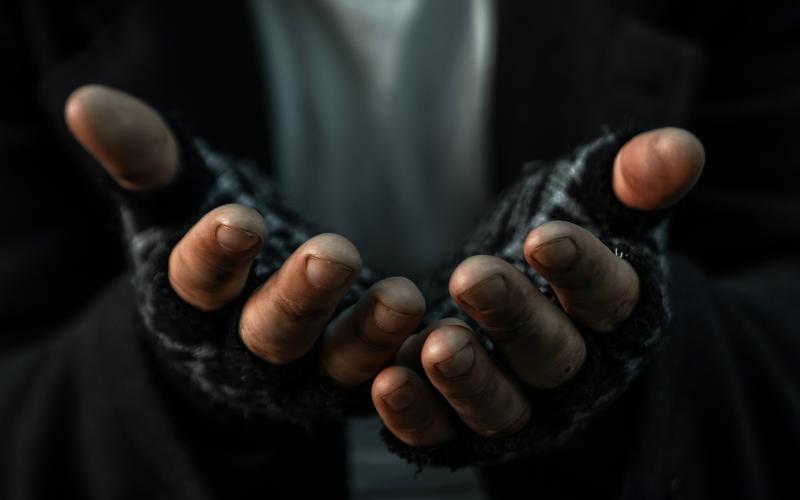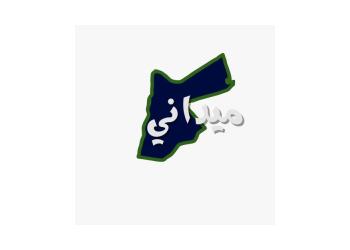Forced Begging, Children of the Forbidden Craft:

Ohood Mohsen
Sawsan –Pseudonym-, 16 years old, waits for the screams of her twin children, announcing their arrival into this world, so that they might accompany her in her journey of begging and wandering between the streets and traffic lights.
Sawsan comes from a gypsy environment, locally known as ‘Nawar’, members of whom take up begging as a profession and consider it a source of income. According to the director of the Anti-Begging Unit in the Ministry of Social Development, Maher Kalloub, the vast majority of this group are illiterate who neither read nor write and lack the skills to work in any trade or craft, with the exception of some simple crafts that do not provide a financial income equal to what they gain from begging.
Sawsan says, “I provide a decent income for my family by begging, and my father and husband have no issue with the matter, as it was my profession even before I was married.” She confirms that she will be back at work after delivering her twins, hoping they will be taking part as she goes back to the streets, despite having several begging cases recorded against her, and being admitted several times into The Rehabilitation and Welfare Center of Beggars in ‘Dhalil’, as she is illiterate and lacks any other craft.
The director of The Rehabilitation and Welfare Center of Beggars in Dhalil, Nadia Al Nemr, confirms that the repetitive nature of begging crimes for minors is tied to social, economic, and legal factors, and in no case should the responsibility of the crime fall solely on the minor ‘child’.
She goes on to say, “The legislations in place are ineffective, they place the child in confrontation with the law without finding ways to prosecute those who exploit the child in the first place, who in turn find ways to bring the child out of the welfare centers and back into the street in less than a week.”
She clarifies that the social factors surrounding the individual and the acceptance in their social environment of begging as a legitimate profession, in addition to the sizable income it provides, is contributing to the increase of beggars’ numbers. Despite repetitive cases being registered against them and being admitted into welfare centers, the above factors negatively affects the success of their rehabilitation programs.
Begging and Harassment
Asmahan–Pseudonym-, 16 years old, talks about young men who harassed her during her work, showing innate understanding and acceptance of what occurred and taking it for granted as a normal part of everyday life between young men and women. When asked for details of the incident by a social facilitator from Tamkin center, Khawla Abdullah, she says, “I mean when a boy asks for a girl to come with him what would he want? Unless it’s something indecent?” Confirming that she neither accepted to go with the man, nor allowed him to get close to her, while keeping an apprehensive eye towards her begging partners.
What happened to Asmahan is a frequent occurrence among girl beggars according to Abdullah. With other similar cases having developed into multiple harassments, some of which are sexual in nature, with others being physical and verbal. As those girls are often subject of verbal abuse by young men, who sometimes chase them and attempt to steal what little they accrued while being on the street, which puts them in danger.
Forced Begging
Social Facilitator Khawla Abdullah confirms the existence of cases where the victim is exposed to familial and social circumstances that might force them into begging. As is the case of Sana –Pseudonym-, 14 years old, who begs due to the wishes of her father, who says, “If you don’t beg, your siblings will starve to death.” While he remains unemployed, and does not look for employment according to her, so she is forced to go on the streets instead of completing her education.
Abdullah sees that the process of dealing with minors (juveniles) either when conducting social studies or filing the report of their arrest is bureaucratic at best. As there is no follow up to check the veracity of the information in the reports, or to verify the reality of the conditions they live in and the pressures they are under. This is to confirm if begging has become a profession to them, or if it is a byproduct of the deterioration of their living situation and the need of their families for a primary or secondary income to live on. Which in turn leaves the door open for them to go back to the streets at any time, especially in the absence of a social protection system that cares for society’s poorest and most marginalized groups.
Safaa Al Jaioushi, spokesperson for ‘Save the Children Jordan’, confirms that these children are not the only victim of violence that undermines the foundation of societal progress, and affects the society as a whole, hence this issue should be treated in an encompassing and comprehensive manner.
She goes on to say that shielding children from violence is one of the pillars of human rights, due to the long lasting psychological effects violence has on children, and its severe consequences on their growth and development. Moreover, there are close to 152 million children involved in child labor around the world, that is approximately one in every ten children, Half of those (approximately 73 millions) are doing dangerous work including begging, which will have long-term complications.
Exploitation for Begging
The director of the Anti-Begging Unit in the Ministry of Social Development, Maher Kalloub, confirms that dealing with beggars of all categories is done according to the law, and the instructions received. Noting that the Ministry’s job is limited to apprehending the beggars and transferring them to the justice system, which in turn handles adjudication and the transfer of the juveniles among them to welfare or placement centers.
He adds that it is not in the jurisdiction of the ministry to follow up on cases after transferring them to the justice system. Moreover, the main problem with repeated begging offences lies in the legislative texts and their enforcement mechanisms, which need updating in order to better align with the nature of the criminal cases at hand.
He calls for the amendment of legislation to include harsher punishments, especially to those involved in benefiting from begging through the ‘exploitation of beggars’, and using their children and women, while offering them protection and organizing their distribution and considering those to be partners in crime. He also confirms the importance of finding judiciary tools to deal with repeat offenders especially amongst juveniles.
Experts believe that the decrease in beggar numbers is tied to the adoption of the Prevention of Human Trafficking Act 2009, which went into the second constitutional review after it was sent to the National Assembly. This law adds Jordan to the list of countries that consider begging a human trafficking violation, punishable with up to seven years in prison with temporary hard labor, and a fine of up to 20000 dinars.
The draft of the amended Prevention of Human Trafficking Act 2009, signals the modification of paragraph B of article 3 of the original law, so that it reads as follows, “the term exploitation means the exploitation of persons in forced labor, servitude, removal of organs, prostitution or any form of sexual exploitation.”
Article 9 of this law states that, a punishment of imprisonment for a term not exceeding seven years with temporary hard labor, and a fine of not less than five thousand dinars and not more than twenty thousand dinars shall be enforced on anyone who has sold a person under 18 years of age, or has offered them for sale, or has bought them or promised doing so, or has committed a human trafficking violation including begging.












































